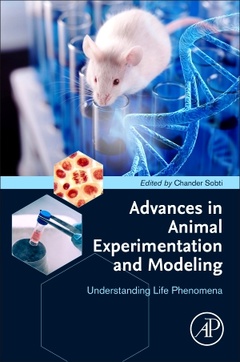Advances in Animal Experimentation and Modeling Understanding Life Phenomena
Coordonnateur : Sobti Ranbir Chander

Exploration in Laboratory Animal Sciences Understanding Life Phenomena updates our knowledge about the newer technologies such as molecular biology, genomics including sequencing, proteomics, transcriptomics, cell culture, stem cell culture, transgenesis and their translation to understand systematics and phylogeny of laboratory animals at molecular level. In seven sections Exploration in Laboratory Animal Sciences Understanding Life Phenomena resolves issues of conservation, applications in environment monitoring, production of drugs and others. Comparative research has enabled use of domestic animal models that translate the advances in basic biosciences to the schemes for human welfare including medicine. Molecular geneticists are unravelling the complexities of mammalian genes and the field of biotechnology is maturing at a fast pace. Additionally, research focused on immunology and animal behavior offer new insight into ways of enhancing animal welfare. The rise in consumption of animal proteins in addition to the challenges of sustaining our natural resources has given animal scientists a vast array of opportunities to engage in integrative systems-based research for meeting the challenges that behold us.
Exploration in Laboratory Animal Sciences Understanding Life Phenomena also discusses the manipulation of animals as factories for the production of safe foods, drugs, and sensors and others to meet the contemporary challenges faced by mankind in the new world order created by pandemic of Covid 19. It also includes several chapters on the causation and management of certain diseases and impact of microbes on life.
2. Microbiological Science
3. Taxonomy and biodiversity
4. Environment Climate Change
5. Genomics, Proteomics, Biotechnology
6. Conservation
7. Diseases
Beginning his career as a Cytogeneticist, Professor Sobti moved on to explore the role of gene polymorphisms and their expression in the genesis of various cancers, COPD, AIDS and metabolic syndrome. He has identified disease susceptible / protective novel genotypes and determined the crucial role of SACS-1 and STAT genes in the genesis of cervical and prostate cancers. He has contributed to 270 research publications, 35 books and 23 sponsored research projects. He has received prestigious awards and medals, including the honor of “Padma Shri from the Government of India for his contribution to higher education. Additionally he was honored with ‘Bharat Gaurav’, Lifetime Achievement Award at the House of Commons, British Parliament, London, UK.
- Provides insight to newer and futuristic technologies to understand disease process and drug design by animal models
- Addresses a wide variety of species and covers a wide variety of topics (such as animal species, the laboratory setting, regulatory guidelines, and ethical considerations) to fully prepare for work with all types of animals
- Gives a perspective on laboratory animal use that allows to explain the benefits of animal use as required by veterinary technology program accreditation procedure
- Includes examples of animal bio-technological techniques (including stem cell and tissue engineering) for their applications to humanity
- Offers new insight into ways of enhancing animal welfare by the inclusion of research results focused on immunology and laboratory animal behavior
Date de parution : 12-2021
Ouvrage de 502 p.
15.2x22.8 cm
Thème d’Advances in Animal Experimentation and Modeling :
Mots-clés :
?12SrRNA; 3Rs; Accumulation; Adaptation; Adverse drug reactions; Agriculture; Animal genetic diversity; Animal husbandry; Animal models; Animal research; Animal farming; Anterior-posterior; Antioxidants; Antitubercular drugs; Apiculture; Arctic circle; Arctic research station; Artificial Intelligence; Artificial insemination; Atmosphere; Atmospheric interactions; Barcoding; Barriers; Beekeeping; Biopharming; Bioprospecting; Black pigmentation response; Blattodea; Bones; Buffalo breeds; COI; COII; CRISPR/Cas9; CRISPR/Cas9 based animal models; Capacity building; Cardiac hypertrophy; Cardiomyopathies; Cattle; Cattle and buffalo; Cattle genome diversity; Challenges; Climate change; Clusters; Conception; Congestive heart failure; Conservation measures; Corridors; Crossbred adoption; DNA polymorphism; Dairy animals; Dairy husbandry; Detoxification; Diabetes mellitus; Diabetic complications; Diagnosis; Dorsal gradient; Dorsal-ventral; Drosophila melanogaster; Eco-biology; Economical methods; Ecosystems; Effect indicators; Embryonic stem cell; Entomopathogenic; Ethical issues; Fat metabolism; Fertility; Fertilization; Fish diversity; Flow cytometry; Flying foxes; Food security; Freshwater fish; Future production; Gangetic dolphin; Gap genes; Genetic engineering; Genome reprogramming; Genomic DNA; Germplasm; Global status; Habitat preservation; Habitats; Haplogroups; Heat stress on animals; Helminth; Helminth bioindicators; Hematological parameters; Hepatotoxicity; Hepatotoxins; Herceptin; Holometabolus insect; Human patient simulators; Human population; Human volunteers; Human-wildlife conflict; Implementation; In silico; In vitro; In vivo imaging technique



